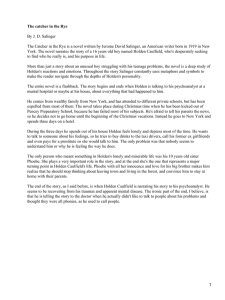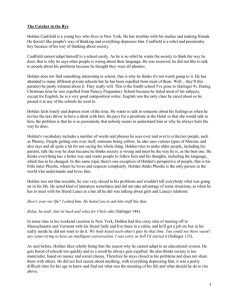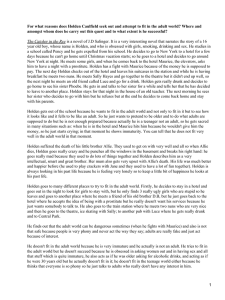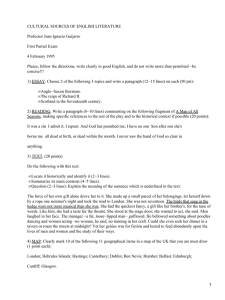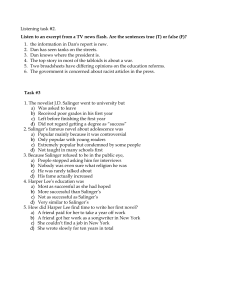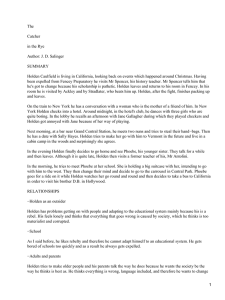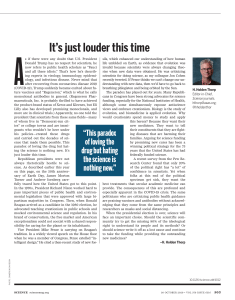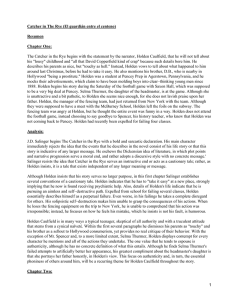El guardián entre centeno; Jerome David Salinger
Anuncio
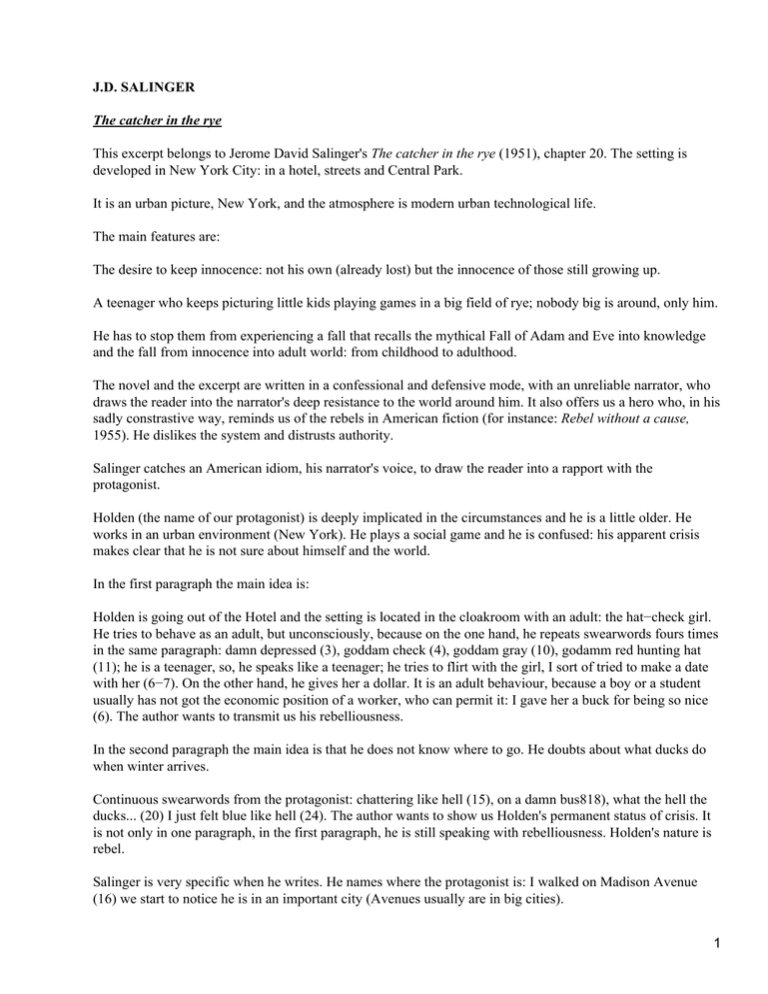
J.D. SALINGER The catcher in the rye This excerpt belongs to Jerome David Salinger's The catcher in the rye (1951), chapter 20. The setting is developed in New York City: in a hotel, streets and Central Park. It is an urban picture, New York, and the atmosphere is modern urban technological life. The main features are: The desire to keep innocence: not his own (already lost) but the innocence of those still growing up. A teenager who keeps picturing little kids playing games in a big field of rye; nobody big is around, only him. He has to stop them from experiencing a fall that recalls the mythical Fall of Adam and Eve into knowledge and the fall from innocence into adult world: from childhood to adulthood. The novel and the excerpt are written in a confessional and defensive mode, with an unreliable narrator, who draws the reader into the narrator's deep resistance to the world around him. It also offers us a hero who, in his sadly constrastive way, reminds us of the rebels in American fiction (for instance: Rebel without a cause, 1955). He dislikes the system and distrusts authority. Salinger catches an American idiom, his narrator's voice, to draw the reader into a rapport with the protagonist. Holden (the name of our protagonist) is deeply implicated in the circumstances and he is a little older. He works in an urban environment (New York). He plays a social game and he is confused: his apparent crisis makes clear that he is not sure about himself and the world. In the first paragraph the main idea is: Holden is going out of the Hotel and the setting is located in the cloakroom with an adult: the hat−check girl. He tries to behave as an adult, but unconsciously, because on the one hand, he repeats swearwords fours times in the same paragraph: damn depressed (3), goddam check (4), goddam gray (10), godamm red hunting hat (11); he is a teenager, so, he speaks like a teenager; he tries to flirt with the girl, I sort of tried to make a date with her (6−7). On the other hand, he gives her a dollar. It is an adult behaviour, because a boy or a student usually has not got the economic position of a worker, who can permit it: I gave her a buck for being so nice (6). The author wants to transmit us his rebelliousness. In the second paragraph the main idea is that he does not know where to go. He doubts about what ducks do when winter arrives. Continuous swearwords from the protagonist: chattering like hell (15), on a damn bus818), what the hell the ducks... (20) I just felt blue like hell (24). The author wants to show us Holden's permanent status of crisis. It is not only in one paragraph, in the first paragraph, he is still speaking with rebelliousness. Holden's nature is rebel. Salinger is very specific when he writes. He names where the protagonist is: I walked on Madison Avenue (16) we start to notice he is in an important city (Avenues usually are in big cities). 1 A metaphor: he is lost but the author wants to say he FEELS loss. He depicts Holden like a teenager lost in a big city with no idea what to do, what way to take I didn't even know where I was supposed to go (18−19); but in fact he is a person with many inner conflicts and with a lost mind in an ocean of doubts. We already know Holden is depressed because he told it to us at the beginning of the first paragraph. When he decided where to go, he did not know exactly why. Doubt: are the ducks in the lake or not? With this, the author wonders if it is worth to pass through everything. Any special place to go (22): without happiness or illusion for anything. In the third paragraph, the main idea consists of the breaking of Phoebe's record. What does the author want to show with this? Another metaphor: the record is childhood and when it falls down, it breaks into pieces: there is no hope for childhood. Kids have/ MUST grow up and despite the fact that he still wants to save it, he takes the pieces and keeps them. He is realising he cannot do anything but he still believes in his mission. This is reflected in the text when he is crying and, at the same time, upset: I damn near cried (27) and they weren't any good for anything (28−29) The syntax and the language is simple and particular: Holden is against the system. Kids like Phoebe, her little sister, are exposed to danger, the corruption from adults. Central Park's ducks: what do they do when the lake is frozen? It is a constant worry for children, preventing their fall, avoiding their suffering. Time and space are cold, ice, nice, alone, lost....with this adjectives and an image like this we can think about how he feels. In the fourth paragraph, the main idea is again, one more time the same: he is lost; but now it is worth: he is lost in a very well−known area by him. Finally, he found the lake. The myth of the fall is very well shown here by the author: he keeps falling and so on. There are no ducks, the lake is almost frozen. At this moment in the novel, the author wants to show us that it is useless Holden's intention. It is inevitalbe children grow up. It is natural as ducks have got feathers to defend themself. In order to the novel is developed, he is lossing his innocence: he is falling and he is conscious about his loss innocence. At the same time, it is a psychological falling: a depression. The myth is around all the novel and it is seen as well in this excerpt. The syntax here is the same than in the other paragraphs, all the time swearwords like damn lake (40), damn clear(40). Very easy to undersatand. The swearwords meas he is rebel and immature.. the author makes a great mishandling of colloquial language. Very specific with the places: New York (31) I know Central Park (31) Central Park South (34) In the last paragraph the author mentions the ice, cold, bad wheather, winter...and Holden's feelings are in tone with the wheather. He sat down. Quiet, without movement in a cold night and he thinks about death. 2 Reference to death is another symbol about his psychologic fall. Almost fall down into the lake: another symbol deals with death. This type of words creates the setting in Holden's mind. Depressed and lost. Words deal with his feelings. The excerpt has got a great sense of American novel, only with the title: the catcher in the rye. The catcher is a player in baseball...very typical amercan game. The cathcer avoid the ball gou out. The same thing does the protagonist with children. 3
